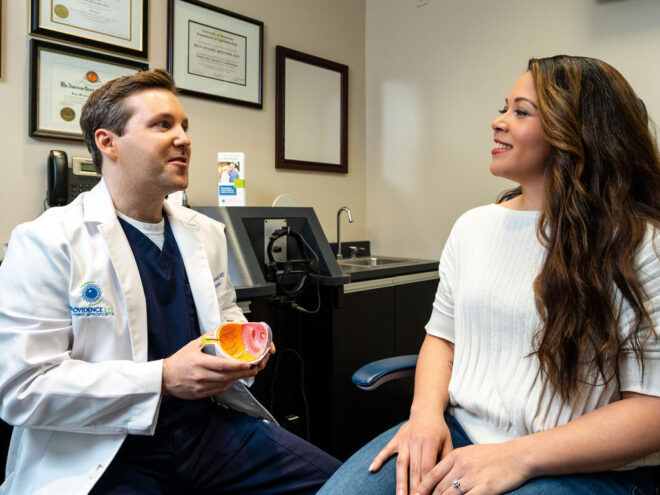
LASIK eye surgery is one of the most transformative medical procedures available today. The prospect of living without being dependent on glasses or contacts is life-changing for millions. However, as with any surgical procedure, LASIK is an important medical decision that requires proper research and careful consideration. Seeking a second opinion for LASIK eye surgery isn’t just a recommendation; it’s a crucial step in ensuring you receive the highest quality care tailored to your unique eyes. Here’s why a second opinion for LASIK eye surgery matters and what you should look for in a quality LASIK consultation.
A high-quality LASIK consultation is the foundation of a successful procedure. At Providence Eye & Laser Specialists, our surgeon Dr. Trey Nunnery ensures that every aspect of your eye and whole-body health is taken into consideration. Your eyes are as unique as your fingerprint, and understanding their specific anatomy and health is essential. Here are the components that should be included in any LASIK consultation:
If you wear contact lenses, it’s important to discontinue use before your LASIK consultation. Contacts can temporarily alter the shape of your corneas, which may affect the accuracy of diagnostic tests like corneal mapping. Your doctor will provide specific guidance on how long you should refrain from wearing contacts—typically 5-7 days for soft lenses and longer for hard lenses—to ensure the most accurate measurements and evaluation.
Your consultation should include dilating your eyes. This allows the doctor to examine the health of your entire eye, specifically the retina in the back of the eye. Additionally, the data received about your prescription while your eyes are dilated is a critical part of your customized LASIK procedure.
LASIK is surgery on the cornea, so precise measurements of your corneas are essential. Advanced diagnostic tools, such as corneal topography and wavefront technology, should be used to create a detailed map of your corneas. This data ensures the surgeon can customize your treatment plan and deliver optimal results.
You should always meet your actual surgeon during the consultation—not just an optometrist, nurse, technician or surgery scheduler. Only an ophthalmologist (a doctor with a medical degree, MD) can perform the procedure and is truly qualified to determine candidacy. Dr. Nunnery does all of the LASIK consultations at Providence Eye. The surgeon’s expertise and experience are critical to the success of your procedure. A cornea specialist, such as Dr. Nunnery has extensive training and expertise in the part of the eye that LASIK directly affects, ensuring the highest level of care.
A comprehensive consultation should take about two hours. This time allows for thorough testing, eye dilation, detailed explanations of the technology being used, a discussion with your surgeon about whether LASIK is the best option for you and time to have all of your questions answered. You should never feel rushed or pressured into making a decision. Instead, the consultation should empower you with knowledge so you can make an informed choice.
If you have had a LASIK consultation and one, or more, of these components were missing, then a second opinion for LASIK eye surgery will be very enlightening. If your LASIK consultation was comprehensive as noted above it is still a good idea to have a second opinion which will enable you to compare two different practices and surgeons.
When it comes to LASIK, some patients are drawn to the promises of quick, low-cost procedures offered by corporate LASIK facilities. While these facilities may advertise convenience and affordability, it’s important to ask questions and do your due diligence.
LASIK eye surgery, like any other surgery, is an important medical decision that deserves the same level of research and diligence, which is why a second opinion is so important. Many LASIK facilities are not locally owned and may prioritize volume over patient care, which can lead to:
Choosing a surgeon for your LASIK eye surgery who owns their practice and has a vested interest in the long-term health and satisfaction of their patients typically ensures a more personalized and professional approach.
In addition to the objective components of a LASIK consultation, there are subjective factors that can influence your experience and confidence in your surgeon. Ask yourself the following questions:
Local, independent surgeons, especially those with specialized training as cornea specialists, offer significant advantages over corporate LASIK centers. They take pride in their community and are dedicated to providing exceptional care tailored to each patient. At Providence Eye & Laser Specialists, Dr. Nunnery combines advanced technology with personalized care to ensure every patient feels confident and informed.
A cornea specialist’s expertise is unmatched when it comes to LASIK. Their in-depth knowledge of corneal anatomy ensures the highest level of precision and safety. Plus, as local doctors, they are invested in their patients’ outcomes and satisfaction, offering a level of accountability that corporate centers cannot match.
Getting a second opinion for LASIK eye surgery isn’t necessarily about doubting your first consultation; it’s about ensuring you’re making the best possible decision for your eyes. The right surgeon will welcome your diligence and respect your desire to gather as much information as possible.
Remember, LASIK is a life-changing procedure. By taking the time to seek a second opinion for LASIK eye surgery and ensuring your consultation includes all the necessary components—both objective and subjective—you can move forward with confidence, knowing you’ve chosen the best care for your vision.
Schedule a complimentary consultation with LASIK eye surgeon Dr. Nunnery today and experience the difference of a personalized, patient-focused approach to LASIK. Your eyes deserve nothing less.